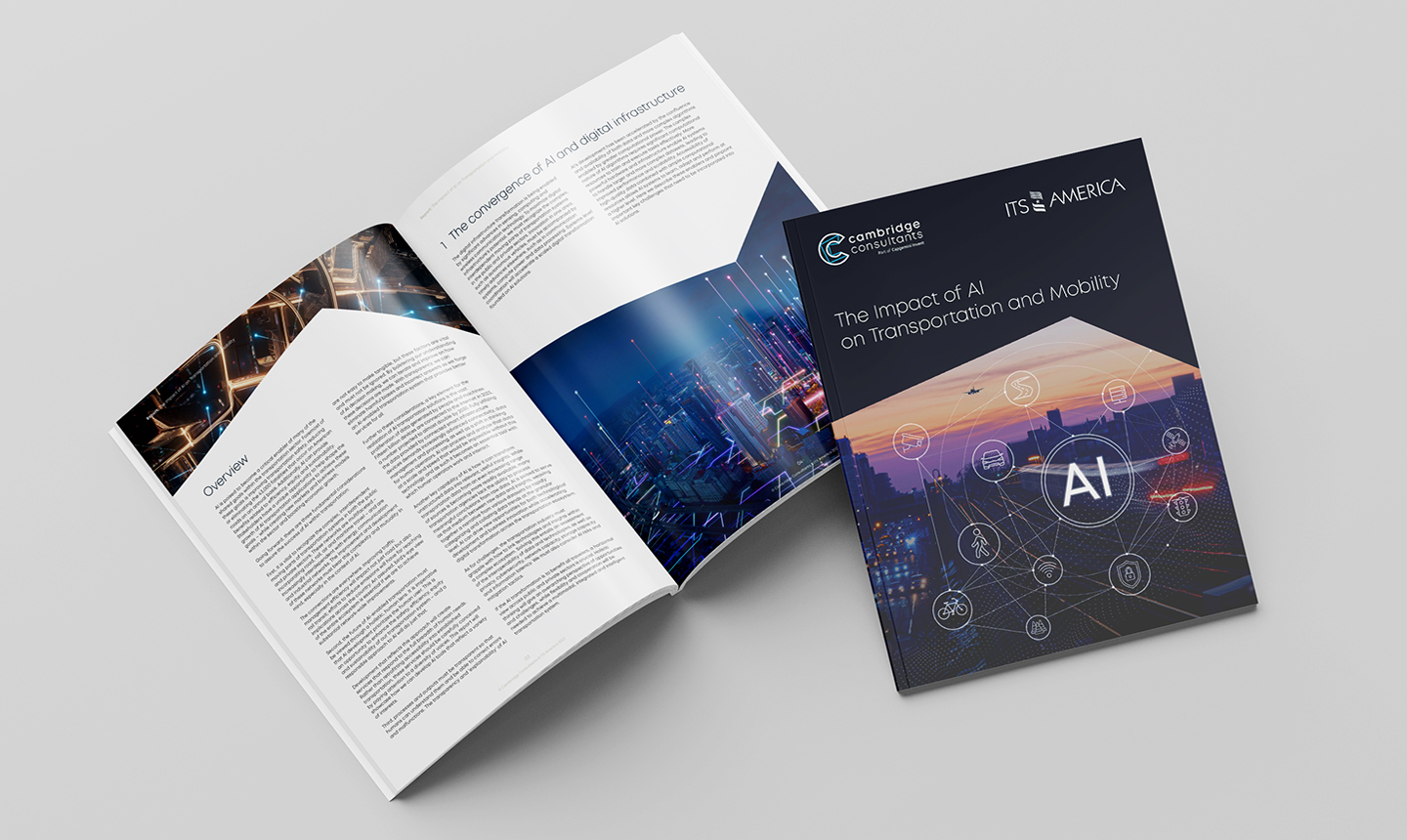Transportation systems across the world are set for a dramatic transformation, thanks to the deployment and application of AI-enabled deep tech innovation. Authorities in the United States are determined to propel positive change sooner rather than later – which made it all the more energising for a team here at CC to collaborate on a visionary report that unpacks the promise of AI for transportation and mobility.
Its findings have implications for a wide range of sectors and industries, and deals with important global issues such as climate change, sustainability and equity. The report, titled ‘The Impact of AI on Transportation and Mobility’ is CC’s second collaboration with The Intelligent Transportation Society of America (ITS America). You can read our first report collaboration, on digital infrastructure, here. ITS America advises the US federal government on transportation technology and deploying intelligent transportation systems. Its vision is for future transportation system that is safer, greener and smarter for all.
There’s no doubt that in the coming decades, AI innovation will help propel far-reaching improvements in transportation safety, efficiency, equity and sustainability. In tandem with ITS America, CC believes that AI can be a critical contributor with significant public benefits within the transportation sector, helping transportation stakeholders successfully achieve ambitious improvements to the way that transportation planning, operation and user experience are managed within the US.
However, success will require robust coordination among federal leaders, transportation planners, technology developers and other related stakeholders. Download the report below to discover what the team believes are some of the key considerations for navigating the next phase of AI in transportation development and deployment.
AI in the American transportation sector
We explore how artificial intelligence can fundamentally change the capabilities of the American transportation sector, while outlining key challenges and solutions associated with the deployment of transportation AI technology. The report proposes key principles of responsible AI utilisation, identifies key stakeholders involved with AI implementation and summarises the recent regulatory environment for AI within the United States and among key global partners.
We see it as the start of a conversation around initiating a strategic approach to understanding, exploring and leveraging AI technologies. All this will lead to a vision and a roadmap of change.
This report also highlights numerous transportation-specific opportunities associated with AI utilisation, including ways that AI can bolster shared transportation goals like safety, efficiency, sustainability and equity. It contains significant discussion on how AI interacts with transportation data, both in terms of the possibilities associated with AI’s real-time analysis of transportation trends as well as challenges associated with dataset limitations.
The impact of AI on transportation and mobility
It outlines key considerations for cybersecurity vulnerabilities associated with AI deployment, as well as ways that AI can help bolster longstanding security methods for current transportation infrastructure. For me, one of the most interesting sections is one that details how the various categories of AI stakeholders interact, including those classified as ‘thinkers’, ‘planners’, ‘deployers’ and ‘users’.
The report also discusses how those stakeholders can navigate an incomplete regulatory AI environment, accessing new market opportunities and positively impacting society while making meaningful progress towards innovations that will help achieve key transportation goals.

Human-centred AI implementation
The findings of the report stand as a bold, confident vision for a transportation sector empowered by human-centred AI implementation. We concur with the belief that technology must not be deployed for technology’s sake, and that transportation innovation must be designed to make meaningful improvements towards real challenges faced by all transportation users, including those with the fewest mobility options.
This joint CC and ITS America report offers actionable proposals as to how AI implementation can embrace that philosophy and represents a foundational building block on which the next generation of transportation progress can be delivered.
These are exciting times. The report makes clear that a future US transportation powered by AI is within reach. The contents have relevance across the world – after all, the challenges of AI in transportation in the US are replicated in multiple geographies.
We are confident that the recommendations within will help shape a future where AI helps to propel a safer, smarter and greener transportation system for all. Do enjoy the report, and do also drop us, キエラン レイノルズ や Sinan Yordem, an email if you’d like to continue the conversation, it’ll be great to hear from you.





